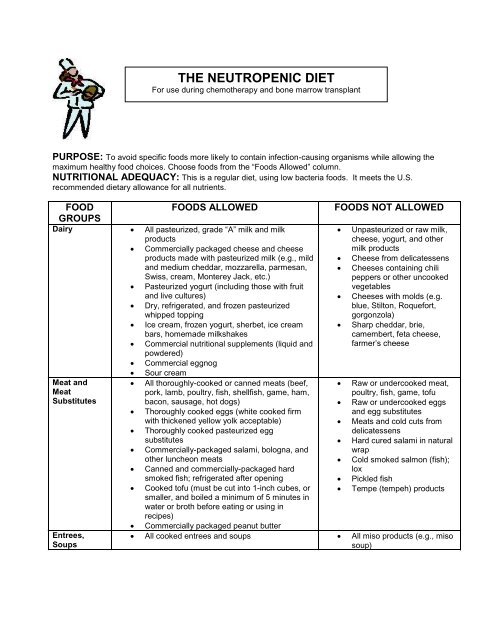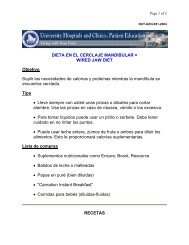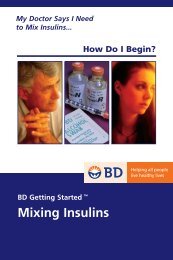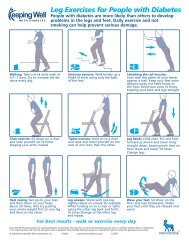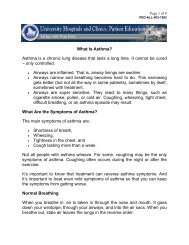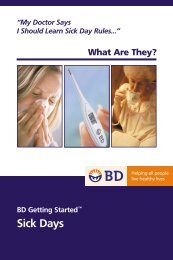THE NEUTROPENIC DIET - Rowland Medical Library - University of ...
THE NEUTROPENIC DIET - Rowland Medical Library - University of ...
THE NEUTROPENIC DIET - Rowland Medical Library - University of ...
Create successful ePaper yourself
Turn your PDF publications into a flip-book with our unique Google optimized e-Paper software.
PURPOSE: To avoid specific foods more likely to contain infection-causing organisms while allowing the<br />
maximum healthy food choices. Choose foods from the “Foods Allowed” column.<br />
NUTRITIONAL ADEQUACY: This is a regular diet, using low bacteria foods. It meets the U.S.<br />
recommended dietary allowance for all nutrients.<br />
FOOD<br />
GROUPS<br />
FOODS ALLOWED FOODS NOT ALLOWED<br />
Dairy All pasteurized, grade “A” milk and milk<br />
products<br />
Commercially packaged cheese and cheese<br />
products made with pasteurized milk (e.g., mild<br />
and medium cheddar, mozzarella, parmesan,<br />
Swiss, cream, Monterey Jack, etc.)<br />
Pasteurized yogurt (including those with fruit<br />
and live cultures)<br />
Dry, refrigerated, and frozen pasteurized<br />
whipped topping<br />
Ice cream, frozen yogurt, sherbet, ice cream<br />
bars, homemade milkshakes<br />
Commercial nutritional supplements (liquid and<br />
powdered)<br />
Commercial eggnog<br />
Meat and<br />
Meat<br />
Substitutes<br />
Entrees,<br />
Soups<br />
<strong>THE</strong> <strong>NEUTROPENIC</strong> <strong>DIET</strong><br />
For use during chemotherapy and bone marrow transplant<br />
Sour cream<br />
All thoroughly-cooked or canned meats (beef,<br />
pork, lamb, poultry, fish, shellfish, game, ham,<br />
bacon, sausage, hot dogs)<br />
Thoroughly cooked eggs (white cooked firm<br />
with thickened yellow yolk acceptable)<br />
Thoroughly cooked pasteurized egg<br />
substitutes<br />
Commercially-packaged salami, bologna, and<br />
other luncheon meats<br />
Canned and commercially-packaged hard<br />
smoked fish; refrigerated after opening<br />
Cooked t<strong>of</strong>u (must be cut into 1-inch cubes, or<br />
smaller, and boiled a minimum <strong>of</strong> 5 minutes in<br />
water or broth before eating or using in<br />
recipes)<br />
Commercially packaged peanut butter<br />
Unpasteurized or raw milk,<br />
cheese, yogurt, and other<br />
milk products<br />
Cheese from delicatessens<br />
Cheeses containing chili<br />
peppers or other uncooked<br />
vegetables<br />
Cheeses with molds (e.g.<br />
blue, Stilton, Roquefort,<br />
gorgonzola)<br />
Sharp cheddar, brie,<br />
camembert, feta cheese,<br />
farmer’s cheese<br />
Raw or undercooked meat,<br />
poultry, fish, game, t<strong>of</strong>u<br />
Raw or undercooked eggs<br />
and egg substitutes<br />
Meats and cold cuts from<br />
delicatessens<br />
Hard cured salami in natural<br />
wrap<br />
Cold smoked salmon (fish);<br />
lox<br />
Pickled fish<br />
Tempe (tempeh) products<br />
All cooked entrees and soups All miso products (e.g., miso<br />
soup)
Fruit and<br />
Nuts<br />
Canned and frozen fruit juices<br />
Canned and stewed fruit<br />
Thoroughly washed raw fruits (see instructions in the<br />
“Neutropenic Diet: Food Safety and Sanitation”<br />
handout for detailed cleaning instructions)<br />
Dried fruits<br />
Canned or bottled roasted nuts<br />
Nuts in baked products<br />
Commercially packaged peanut butter<br />
Vegetables All cooked frozen, canned, or fresh vegetables and<br />
potatoes<br />
Thoroughly washed raw vegetables (see instructions<br />
in the “Neutropenic Diet: Food Safety and Sanitation”<br />
handout for detailed cleaning instructions)<br />
Fresh, thoroughly washed herbs and dried herbs and<br />
spices (added to raw or cooked foods)<br />
Bread,<br />
Grain, and<br />
Cereal<br />
Products<br />
All breads, bagels, rolls muffins, pancakes, sweet<br />
rolls, waffles, French toast<br />
Potato chips, corn chips, tortilla chips, pretzels,<br />
popcorn<br />
Cooked pasta, rice, and other grains<br />
All cereals, cooked and ready-to-eat<br />
Beverages Tap water and ice made from tap water<br />
Commercially-bottled distilled, spring, and natural<br />
waters<br />
All canned, bottled, powdered beverages<br />
Instant and brewed c<strong>of</strong>fee, tea; cold brewed tea made<br />
with boiling water<br />
Brewed herbal teas using commercially-packaged tea<br />
bags<br />
Commercial nutritional supplements, liquid and<br />
powdered<br />
Desserts Refrigerated commercial and homemade cakes, pies,<br />
pastries, and pudding<br />
Refrigerated, cream-filled pastries<br />
Homemade and commercial cookies<br />
Shelf-stable cream-filled cupcakes (e.g., Twinkies®,<br />
Ding Dongs®), fruit pies (e.g. Poptarts®, Hostess®<br />
fruit pies), and canned pudding<br />
Ices, popsicle-like products<br />
Unwashed raw fruits<br />
Unroasted raw nuts<br />
Roasted nuts in the shell<br />
Unpasteurized fruit and<br />
vegetable juices<br />
Unwashed raw vegetables<br />
or herbs<br />
All raw vegetable sprouts<br />
(alfalfa, radish, broccoli,<br />
mung bean, all others)<br />
Salads from delicatessens<br />
Commercial salsas stored in<br />
refrigerated case<br />
Raw grain products<br />
Well water (unless tested<br />
yearly and found to be free<br />
<strong>of</strong> coliforms)<br />
Cold-brewed tea made with<br />
warm or cold water<br />
Unpasteurized fruit and<br />
vegetable juices<br />
Mate’ tea<br />
Unrefrigerated, cream-filled<br />
pastry products (not shelfstable)
Fats Oil, shortening<br />
Refrigerated lard, margarine, butter<br />
Commercial, shelf-stable mayonnaise and<br />
salad dressings (including cheese based salad<br />
dressings; refrigerated after opening<br />
Cooked gravy and sauces<br />
Other Salt, granulated sugar, brown sugar<br />
Jam, jelly, syrups; refrigerated after opening<br />
Commercial (heat-treated) honey<br />
Catsup, mustard, BBQ sauce, soy sauce, other<br />
condiments (refrigerated after opening)<br />
Pickles, pickle relish, olives (refrigerated after<br />
opening)<br />
Candy, gum<br />
Fresh salad dressings<br />
containing aged cheese<br />
(e.g. blue, Roquefort) or raw<br />
eggs, stored in refrigerated<br />
case<br />
Raw or non-heat treated<br />
honey; honey in the comb<br />
Herbal and nutrient<br />
supplement preparations<br />
Brewers yeast, if uncooked<br />
Duration <strong>of</strong> Diet<br />
Allogeneneic Transplant: Patients should follow the diet until <strong>of</strong>f all immunosuppressive therapy<br />
(cyclosporine, prednisone, prograf, MMF, thalidomide, etc.)<br />
Autologous Transplant: Patients should follow the diet during the first three months after transplant<br />
Chemotherapy/Radiation: Patients should consult with their physician regarding when to discontinue the<br />
diet<br />
Important Facts to Remember<br />
1. T<strong>of</strong>u must be cut into 1-inc cubes, or smaller, and boiled a minimum <strong>of</strong> five minutes in water or broth<br />
before eating or using in recipes.<br />
2. Patients themselves should not make (mix or knead) any bread product containing yeast.<br />
3. Use distilled or bottled water if using water service other than city water service.<br />
4. Shelf-stable refers to unopened canned, bottled, or packaged food products that can stored before<br />
opening at room temperature; container may require refrigeration after opening.<br />
5. Patients may not consume foods or beverages from restaurants while following the Neutropenic Diet.<br />
6. Wash fruits and vegetables thoroughly under cold running water before peeling and/or cutting. (It is<br />
NOT recommended for patients to peel or cut fruits or vegetables.)<br />
7. Scrub produce that has a thick, rough skin or rind (such as lettuce, spinach, cabbage) individually<br />
under running water. Do not use commercial rinses to wash fruits and vegetables.<br />
8. Packaged salads, slaw mix and other prepared produce, even when marked “pre-washed” should be<br />
rinsed again under running water; a colander can be used to make this easier. Check for “use by”<br />
dates.<br />
9. Throw away fruits and vegetables that are slimy or show mold.<br />
10. No honey products are allowed for children less than one year and all children with SCIDS until 9<br />
months post-transplant.<br />
Adapted from Seattle Cancer Care Alliance, Fred Hutchinson Cancer Research Center.<br />
2009, Department <strong>of</strong> Food and Nutrition Services, The <strong>University</strong> <strong>of</strong> Mississippi <strong>Medical</strong> Center, Jackson, MS


